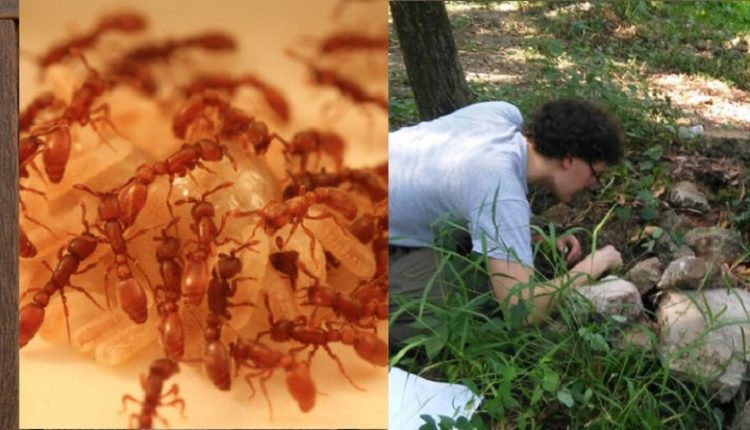The Dhaka Times Desk Harvard researchers have discovered a dangerous species of ants in Bangladesh. This ant has been identified as a destructive species due to its rapid dispersal nature.

Harvard researcher Waring Tribe came to Bangladesh a few years ago to find the birthplace of these ants.
According to a report published in the Harvard Gazette, the official news site of Harvard University, Waring found the ant after coming to Bangladesh via India-Pakistan.
Most of the world's ants are fast-breeding and harmful species. Several of their species are scattered around the world due to human activities. Knowing more about their innate behavior could help control the spread, Waring believes. Waring published details of his findings last June in Biology Letters.
Waring said in his article that this species of ant called clonal raider ant originally spread to the world from Bangladesh.
'We wanted to find the closest evolutionary relatives of the species, so that we could study them in the lab,' said Waring, who has done a lot of research on ants. Good things are known. It is well understood why they are so aggressive.'
Professor Daniel J.C. While working with McKenzie in Kronauer's lab, they identified a nearly identical ant species in India. They first thought of it as a clonal rider. But later realize that the species is different. Then they analyzed the genetic data found in the lab and assumed that their original species could be located 1,240 miles away.
After choosing Pakistan, India and Nepal for research, the Warings settled in Bangladesh. They also dreamed of getting real species around this region as it has large seaports.
Researchers believe that these blind and underground ants were originally spread to the world by monkeys. The researchers believe that the ants may have traveled to different countries with the soil stuck to the sailors' anchors.
No one has ever identified this type of ant in Bangladesh before. However, Waring came to this country and ran from village to village like betting.
This species has no queen. The embryos of worker ants are born without fertilisation. The 2-millimeter-long ant looks 'gutsy' but is eyeless and stings.
Ants are said to be raiders because they dig up other people's habitats and eat their eggs and larvae. Waring and McKenzie came to Bangladesh in October 2014 for research. A German NGO also helped them. When they came to Bangladesh, they took a student named Tauhid Hossain as an interpreter.
These three moved to the western part of the country. While driving along the road, if they saw any land they liked, they would stop there. They used to talk to the owner of the land and started digging with permission.
While doing these things, they fell into danger at one time. Locals think that people from America come looking for ants to eat!
Mackenzie recalls those days, saying, 'Many people wondered what they were doing. What are they digging the ground for? Or they are eating ants.'
However, because Touhid was with him, the Warings' trouble did not increase much. This young man used to explain the real matter in Bengali to the locals.
This is how Waring got the real address at one time. He gets a clonal rider by flipping a brick on a land. Pick it up and dig a big hole. There are only 5 ants.
'It was a moment of great relief,' Waring recalls of the moment. Because we realized that we are not going back empty-handed.'
They work 16 hours a day and get 16 residences. He got about 500 ants in one of them. Keeping them in a moist dish is also dangerous. Keeping it like this for a large part of the day kills three-quarters of the ants. Waring's worries then grew. Because if the ants are not brought to the lab, they will not be able to uncover the gene pattern.
In an article published in June, Waring wrote that we were somehow able to uncover gene patterns back in the lab with ants. We also try to understand whether the origin of the species is Bangladesh or not.
In the analysis they found 7 lineages. Two of these have already been found in other parts of the world. The remaining 5 were nowhere to be seen. After researching in various ways, they confirmed that their birthplace is in Bangladesh.
At the end of the study, Waring breathed a sigh of relief and said, 'This discovery is essentially the ultimate achievement. Solving a mystery.'
Reference: Country Transformation
Things to do to prevent Corona virus
# stay at home all the time.
# Follow the rules and use mask when going out for emergency.
# three-layer surgical mask can be washed if desired.
# wash clothes after coming home from outside. Or hang it without shaking for at least four hours.
# Wash hands thoroughly (for at least 20 seconds) with soap or liquid before coming outside.
# plastic PPE or eyes, mouth, head after single use
Of course it can be washed thoroughly with detergent and dried.
# Wear PPE made of cloth or clean as described.
# Use a head cap that completely covers the hair.
# Those who have sneeze cough should follow all the rules promulgated by the government. Also, wash hands as directed before and after handling food items, keys, switches, mice, remote controls, mobiles, watches, computer desks, TVs, etc. and after using the bathroom. Those who have dry hands use Moisture after washing their hands. Soap or hand liquid can be used. Why can this virus remain in the crackle (cracked part) of dry hands? Avoid using highly alkaline soaps or detergents.


